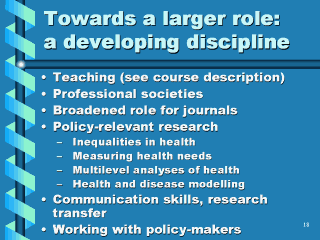| front |1 |2 |3 |4 |5 |6 |7 |8 |9 |10 |11 |12 |13 |14 |15 |16 |17 |18 |19 |20 |21 |22 |23 |24 |review |
 |
We can develop a broadened role
for our professional societies, holding conferences like this one, and perhaps
eventually holding regular international conferences on the Scientific Basis of Health
Policy (analogous to the outstanding international conferences on The Scientific Basis of
Health Services). We can open our journals to policy-relevant material. This is another area in which things are getting better, as in the recently enlivened International Journal of Epidemiology, the Journal of Epidemiology and Community Health and the British Medical Journal (there is not yet much evidence of interest in the American Journal of Epidemiology!). We can use these skills to do policy-relevant research. This includes sophisticated description and analysis of trends and patterns in health (including developing better population health indicators), identifying inequalities in health, measuring health needs, multilevel analyses of health and health problems, and health and disease modelling. We also need research on enhancing the use of epidemiologic research results. We need strengthened communication skills, and expertise in research transfer. We must write in a style that policy-makers will read (e.g., the 1-3-25 rule of the Canadian Health Services Research Foundation, which states that research reports should comprise no more than one page of main messages in point form, a 3-page executive summary, and a 25-page report). The techniques developed in clinical epidemiology for influencing the practice of clinicians may prove useful for influencing the decisions of policy-makers. They are well demonstrated in Sackett’s Evidence-based Medicine and Gray’s Evidence-based Healthcare: how to make health policy and management decisions. Communication brings us close to advocacy, which could easily be the topic of a book or a whole conference, but I shall not go into that topic here (partly because I am not very good at it). We must work with policy-makers. This can go beyond serving on advisory committees to include executive interchanges (where academics are seconded to governments and public servants to universities for one or more years) and cross-appointments. The Canadian Health Services Research Foundation is showing another approach, in its requirement that research applications be co-sponsored by academics and decision-makers and that the applications be reviewed equally from both perspectives. Another approach, for those in universities, is to reach out to colleagues in public administration and the social sciences, and collaborate in projects with them. |
| front |1 |2 |3 |4 |5 |6 |7 |8 |9 |10 |11 |12 |13 |14 |15 |16 |17 |18 |19 |20 |21 |22 |23 |24 |review |